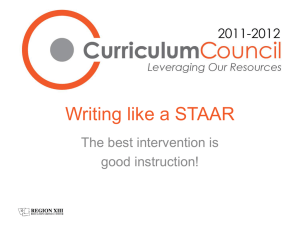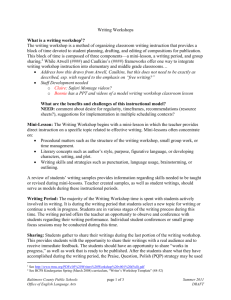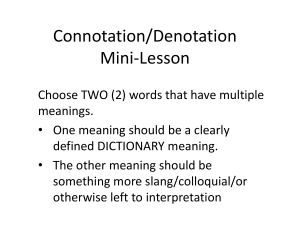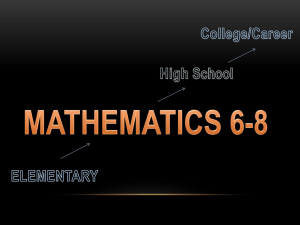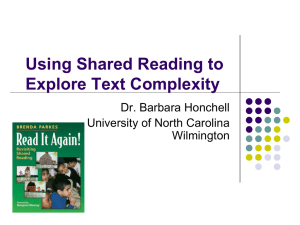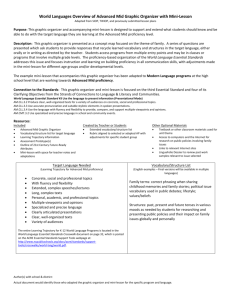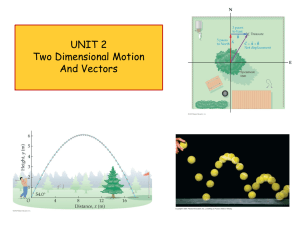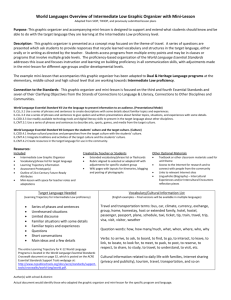Syllabus - SkiadasWeebly.com
advertisement
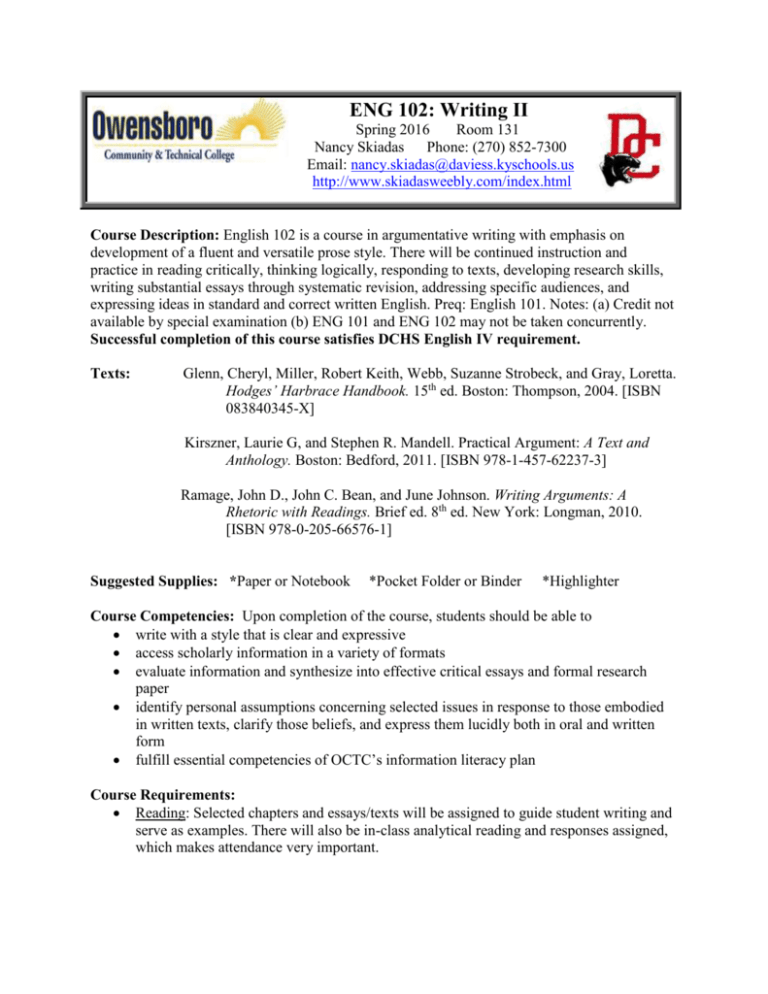
ENG 102: Writing II Spring 2016 Room 131 Nancy Skiadas Phone: (270) 852-7300 Email: nancy.skiadas@daviess.kyschools.us http://www.skiadasweebly.com/index.html Course Description: English 102 is a course in argumentative writing with emphasis on development of a fluent and versatile prose style. There will be continued instruction and practice in reading critically, thinking logically, responding to texts, developing research skills, writing substantial essays through systematic revision, addressing specific audiences, and expressing ideas in standard and correct written English. Preq: English 101. Notes: (a) Credit not available by special examination (b) ENG 101 and ENG 102 may not be taken concurrently. Successful completion of this course satisfies DCHS English IV requirement. Texts: Glenn, Cheryl, Miller, Robert Keith, Webb, Suzanne Strobeck, and Gray, Loretta. Hodges’ Harbrace Handbook. 15th ed. Boston: Thompson, 2004. [ISBN 083840345-X] Kirszner, Laurie G, and Stephen R. Mandell. Practical Argument: A Text and Anthology. Boston: Bedford, 2011. [ISBN 978-1-457-62237-3] Ramage, John D., John C. Bean, and June Johnson. Writing Arguments: A Rhetoric with Readings. Brief ed. 8th ed. New York: Longman, 2010. [ISBN 978-0-205-66576-1] Suggested Supplies: *Paper or Notebook *Pocket Folder or Binder *Highlighter Course Competencies: Upon completion of the course, students should be able to write with a style that is clear and expressive access scholarly information in a variety of formats evaluate information and synthesize into effective critical essays and formal research paper identify personal assumptions concerning selected issues in response to those embodied in written texts, clarify those beliefs, and express them lucidly both in oral and written form fulfill essential competencies of OCTC’s information literacy plan Course Requirements: Reading: Selected chapters and essays/texts will be assigned to guide student writing and serve as examples. There will also be in-class analytical reading and responses assigned, which makes attendance very important. Writing: In addition to in-class writing assignments, students are required to write a formal article summary, a formal critique, an argument synthesis essay, an annotated bibliography, and an extended analytical research paper, including rough drafts, revisions, and appendices. Major writings will be peer reviewed in a “writer’s workshop” fashion. Review of grammar, mechanics, and usage will be provided throughout the course. Speaking and Listening: Students will present research, lead analytical discussions, and provide feedback for those presenting. A final product for the course will include a documentary adapted from extended analytical research paper. Cross-Curricular General Education Competencies: In addition to the course-specific objectives listed above, coursework is also designed to develop in student the following crosscurricular general education competencies: KCTCS General Education Competencies (QEP): I. Communicate Effectively: 1. Read and listen with comprehension. 2. Speak and write clearly using standard English. 3. Interact cooperatively with others using both verbal and non-verbal means. Assessment methods may include analytical essays (QEP-WE L4), small group exercises (QEP-OE L1), and brief class presentations (QEP-OE L2). II. Think Critically: 1. Make connections in learning across the disciplines and draw logical conclusions. 2. Demonstrate problem solving through interpreting, analyzing, summarizing, and/or integrating a variety of materials. Assessment methods may include research and documentation within papers (QEP-WE L4), small group exercises (QEP-OE L1), and writing assignments (QEP-WE L3). III. Learn Independently: 1. Use appropriate search strategies and resources to find, evaluate, and use information. 2. Make choices based upon awareness of ethics and differing perspectives/ideas. 3. Apply learning in academic, personal, and public situations. 4. Think creatively to develop new ideas, processes, or products. Assessments methods may include research (QEP-R L2), journal writing (QEP-WE L2), drafting (QEP-WE L2), small group exercises (QEP-OE L1), discussion (QEP-OE L1), and classroom presentations (QEP-OE L2). IV. Examine Relationships in Diverse and Complex Environments: 1. Recognize the relationship of the individual to human heritage and culture. 2. Develop an awareness of self as an individual member of a multicultural global community. Assessments methods may include journal writings (QEP-WE L2), discussions (QEP-OE L1), and class presentations (QEP-OE L2). Attendance Policy: Regular attendance and class participation are expected from every student. More than three absences are considered excessive, and a penalty per absence will be assessed thereafter. Daviess County Public School attendance policy will apply. Take Note: The syllabus is subject to change, as additional readings may be assigned and dates may be changed. Any changes in the syllabus will be announced in class. Therefore, if you miss a class, you should check with me or another student as to what you missed and any changes made to syllabus. Late Work Policy: Assignments are to be turned in on the due date. Late papers will be assessed a ten point penalty per class meeting that they are late. Papers more than two class meetings overdue will not be accepted. IMPORTANT NOTE: NO papers accepted during Finals Week Make-up Policy: Daviess County High School policy for make-up work will apply. If you know you will not be in class on the date an assignment is due, please make arrangements to get your paper to me before that date. Withdrawal Policy: Students may choose to withdraw from the class at any time during the semester. Through midterm, those who withdraw will automatically receive a grade of “W”; however, after that date, the instructor will assign either a “W” or a “WE” at her discretion. Plagiarism: The use of another person’s work, ideas, papers, or other such materials without clearly acknowledging the source is an act of plagiarism and will be dealt with in accordance to the guidelines set forth in the Student Code of Conduct at http://owensboro.kctcs.edu/en/Student_Life/KCTCS_Student_Code_of_Conduct.aspx The Quality Enhancement Plan (OEP): OCTC has embarked on a five-year Quality Enhancement Plan (QEP) to improve student learning through the setting of clear expectations for all OCTC student—expectations founded on our general education competencies and focused on 1) the expression of ideas, 2) the ethical and personal responsibility to be exhibited by every member of the OCTC community of learners, 3) the life-long need for social/civic interaction and learning. For more information visit: http://legacy.owensboro.kctcs.edu/ir/qep/ Disability Accommodations: Students with disabilities who require accommodations (academic adjustment and/or auxiliary aids or services) for this course must contact the Disability Services Office in the Counseling Center, Campus Center Building, Room 102B. The DSO telephone number is 270.686.4528. Dial 711 for TDD protocol. Please DO NOT request accommodations directly from the instructor without a letter of accommodation from the Disability Services Office. Students in global on-line classes are to contact their Home College for disability accommodations and inform their instructors. The Home College DSO contact information is located at this KCTCS website: http://www.kctcs.edu/students/distance_learning/disability_services.aspx . Once the student has contacted the Disability Services Officer at the Home College, the Home College DSO will communicate with the student's instructors and/or the Disability Services Officers at the Delivering College in order to coordinate and/or provide reasonable and appropriate accommodations to the student. In compliance with federal law, including the provisions of Title IX of the Education Amendments of 1972, Sections 503 and 504 of the Rehabilitation Act of 1973, and the Americans With Disabilities Act of 1990, Owensboro Community & Technical College does not discriminate on the basis of race, sex, religion, color, national or ethnic origin, age, disability, or military service in its programs or activities: its admissions policies; scholarship and loan programs; athletic and other College-administered programs; or employment. In addition, the College does not discriminate on the basis of sexual orientation consistent with KCTCS nondiscrimination policy. Inquiries or comments regarding these issues should be directed to the Disability Services Officer/504/ADA Compliance, Owensboro Community and Technical College, 4800 New Hartford Road, Owensboro, KY 42303. Telephone (270) 686--4528, FAX (270) 686-4648. KCTCS Student Code of Conduct: OCTC and KCTCS strive to maintain an atmosphere of academic freedom and personal respect that creates an environment in which all can be successful. As part of this commitment, KCTCS has developed a Code of Student Conduct that serves as a guide for the student’s responsibilities and rights within our academic community. For more information, visit: http://owensboro.kctcs.edu/en/Student_Life/KCTCS_Student_Code_of_Conduct.aspx Grading: A 90-100 B 80-89 C 70-79 D 60-69 F 59 and below Major Assignments: Formal Academic Summary Formal Academic Critique Synthesis Essay Annotated Bibliography Extended Research Project Revisions/Peer-Reviews In-class, daily, homework, quizzes Mini-Documentary 50 50 100 100 200 100 150 150 Course Outline: Week 1 Week 2 Introduction to Writing II - Syllabus Introduction to Big O Research Project: Extended Research Project and Sign-up on Day 4 Review of Grammar and Mechanics: 40 Errors, using Handy, Dandy Editing Checklist Review Purdue OWL Difference Between Journals, Trade Journals, etc. How to Read and Annotate Journals and example Review How to Write Summaries (cr) Practice Summary (from How to Read and Annotate Journals) – In class re differences between men and women’s brains – thesis, key ideas, chunking. Determining Credibility of Sources—Critical Evaluation of a Website Summarizing, Paraphrasing, Quoting, and Synthesizing Sources: Read Chapter 9 (Practical Argument) Take notes. May bring one page (8x11) with notes for quiz—only one side so be concise with note taking. Quiz: Ch. 9 Reading Article Summary Due (related to topic) Research/Sign up for Extended Research Project Subject Research/Begin Annotated Bibliography Research Techniques: Searching the Web/Databases for Sources (Ch. 8 Practical Argument) Determining Credibility of Sources—Critical Evaluation of a Website Week 3 Week 4 Week 5 Week 6 Week 7 Week 8 Week 9 Monday – MLK Day Contact with Potential Interviewees Critical Reading: Read Chapter 2 (handout: Elements of Formal Critique Read pgs. 24-33) (handout) in class—summarizing and analyzing graphics “C8H10N4O2”article Decoding Visual Arguments (Ch.3 Practical Argument) Choose one article related to topic Assign Article Critique Mini-Lesson: Introductory Phrases Article Critique Draft Formal Critique Checklist Article Critique Due Assign Synthesis Essay (Historical/Informational or Significance/Argument)-- half of Part B Introductions, Theses, Conclusions Read Chapter 3 pp. 72-78 Documentary Techniques: Strategies for Reaching Your Audience Mini-Lesson: Introduction of Authors/Contributors/Experts Mini-Lesson: Appositive Phrases Generating Interview Questions/Conversion of Interview to Article Format Madoff and Student Example Conduct Interviews/Ground Research (out day) Synthesis: Argument Synthesis Model Read Chapter 4 pp. 91-101 Practice Synthesis of Information Draft of Synthesis Essay Editing Checklist: Self Check/Peer Edit Mini-Lesson: Avoiding There and It Mini-Lesson: This and That Mini-Lesson: Idioms iMovie Technology Lessons Final Synthesis Essay Due Conclude Annotated Bib Research/Interview Day iMovie Technology Lessons Mini-Lesson: Embedding Quotes Mini-Lesson: Enhancing Quotes (not just restating) Mini-Lesson: Pronoun/Antecedent Annotated Bib Final Due – Part A Begin Work on Analytical Research Paper (ARP) – All of Part B Mini-Lesson: A Closer Look at My Writing Mini-Lesson: Said is Dead (says, talks about, goes on to say, mentions) Continue Work on ARP Mini-Lesson: Comma Splices Mini-Lesson: Sentence Combining (avoiding anadiplosis) Mini-Lesson: Sentence Combining: Subordination and Coordination Analytical Research Paper (ARP) DUE (6 pages) Begin Work on Interview Narrative – Part C Mini-Lesson: Replacing Wishy-Washy Language (many, very, a lot, things) Mini-Lesson: Topic Sentences (not merely quotes) Mini-Lesson: Paragraph Development Week 10 Week 11 Week 12 Week 13 Week 14 Week 15 Week 16 Week 17 Continue Work on Interview Narrative Mini-Lesson: Transition within Paragraphs Mini-Lesson: Transition between Paragraphs Mini-Lesson: Replacing Questions in Body Paragraphs Interview Narrative DUE Mini-Lesson: Concision in Writing Mini-Lesson: Repetition in Sentence Beginnings Mini-Lesson: Academic Word Choice/Tone Begin Potential Solutions Essay -- Part D Mini-Lesson: Characterizing Interviewee with Relevant Details Mini-Lesson: Dialogue, Punctuation, Signal Phrases Mini-Lesson: Differentiation of Own Knowledge from Expert/Sources Potential Solutions Essay DUE Reread/Edit Combined Paper for Continuity Check Bibliography against Sources Cited in Final Draft Peer Edit Final Draft Final Draft of COMPLETE Extended Research Paper with Combined (Revised) Annotated Bibliography DUE Convert Research Paper to Mini Documentary See Video Production on Wiki iMovie Lessons Continue Work on Mini Documentary iMovie Lessons Conclude Video Documentary/Upload to Youtube Channel Name Project with Topic-Specific Title Present Video Adaptations Final Exam: Synthesis Essay
